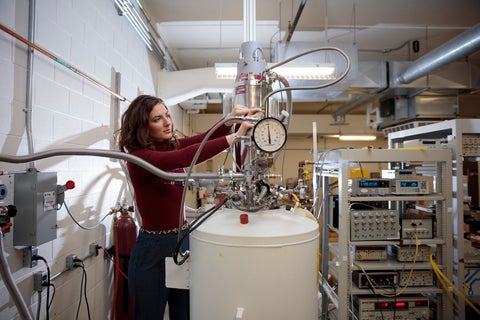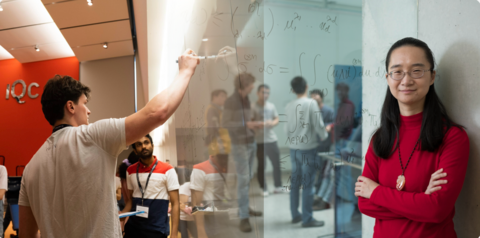
Gain hands-on experience in world class labs and facilities
Train on cutting-edge hardware and simulation platforms in 3 dedicated graduate-level lab courses.

Build strong industry connections and career readiness
Apply theoretical and experimental skills through an independent project course aimed at developing research capacity.

Join a thriving community of quantum researchers and distinguished faculty
Prepare to lead in the quantum industry or advance to a quantum PhD program and be part of a thriving community of over 300 researchers.
Program overview
The Master of Science degree in Physics with a specialization in Quantum Technology is a 12-month, course-based degree program. It is offered by the Institute for Quantum Computing in partnership with the Department of Physics and Astronomy and the Transformative Quantum Technologies (TQT) research initiative at the University of Waterloo. This program is the university’s only course-based option for an MSc in Physics.
Instructors emphasize hands-on learning with quantum platforms in a lab dedicated to teaching, which equips graduates with the familiarity and understanding to drive the development and use of quantum technologies.
- Learn about quantum devices and techniques through core experimental courses in coherent control, quantum optics, and superconductivity and take electives from IQC's comprehensive quantum information graduate program.
- Engage in seminars, outreach programs and labs at the forefront of quantum technology.
- Network with industry leaders and startups in quantum technology.
Admissions
Applications for this course-based degree program are limited to a fall term start only (unlike for the thesis-based degree option which has applications open three times a year).
Tuition scholarships will be offered to a limited number of students.
Faculty: Science
Department: Physics and Astronomy
Enrolment term: Fall (September - December)
Delivery mode: On-campus
Program type: Joint
Length of program: 12 months (full-time)
Study option: Coursework
Deadline: January 9, 2026

Why study quantum science and technology at IQC?
→ Be a part of the breakthrough science and research harnessing quantum technology and advancing nearly all aspects of society including communications, medicine and materials science.
→ Join the most interdisciplinary quantum centre in the world – a community of researchers from seven academic home units across three faculties at the University of Waterloo.
→ IQC is at the forefront of quantum workforce training and supports industry through shared-infrastructure and expertise.
Twenty-two startups have spun out of IQC research at the University of Waterloo, the top university for startup founders in Canada.
Hear from our alumni
How did the program prepare you for your next steps, and what experiences have been most valuable after graduation?
Class of 2026
Class of 2022
Class of 2022
Class of 2022
Class of 2022
Class of 2026
Class of 2022
Class of 2023
Class of 2021
Class of 2022
Class of 2022
Class of 2022
Class of 2021
Got questions? We’re here to help
-
For program (courses and labs) specific questions: Michael Grabowecky
-
For Science admission questions: Holly Haig-Brown
-
For IQC admission questions: Paula Roser
-
For technical support or help with your application: Email gradapply@uwaterloo.ca.
